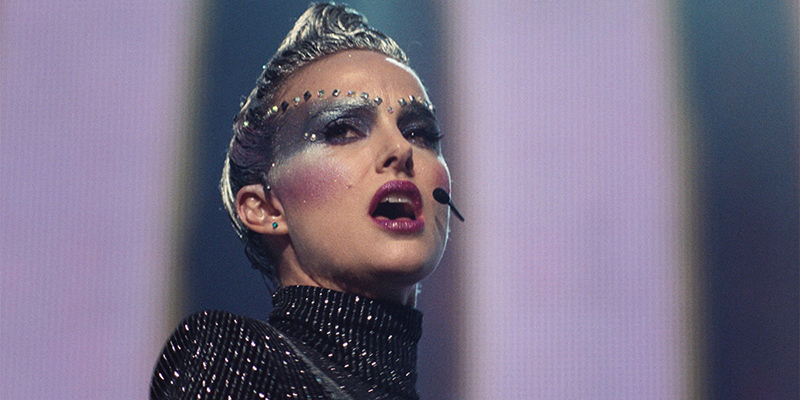Vox Lux

Photo courtesy TIFF.
In 1999, Celeste (Natalie Portman and Raffey Cassidy) suffers from a spinal cord injury inflicted by a school shooter who murders his classmates. With the help of her sister Eleanor (Stacy Martin), during her intensive rehabilitation, Celeste writes a song which goes viral and soon propels her to pop stardom. Soon, her manager (Jude Law, who impressively looks younger as the picture progresses) and publicist (Jennifer Ehle) start booking dance lessons, performances, and studio time. In the middle of all this, several terrorist incidents transpire, including the World Trade Center attacks. Celeste takes it all in stride, believing earnestly that in such times, people need something to lift them up. The road to hell…
The second act catches up with Celeste, now 31, a superstar, and with a daughter, Albertine, who coincidentally looks and acts exactly like 14 year old her (again Cassidy, lending to the film’s surrealist bent). Not only does Eleanor raise Albertine, but she writes all of Celeste’s songs—a devil’s bargain that also serves up an opportunity for a Cyrano metaphor left largely unexplored.
Still, the audience is never treated to something so cliché as a younger rival and the classical downward spiral…. Celeste is already at terminal velocity, past her prime, propped up by drugs, making it through each day by the cracked skin of her booze-dried lips.
Rocked by two scandals, one past and one present, the global pop icon reacts violently to questions posed in a round-table interview about a substance abuse-related incident. She and her daughter skip out of the hotel to chat in a hole-in-the-wall diner down the back street. What follows is, essentially, an acting crash course by Natalie Portman—digging deep into the warped psyche of celebrity that the actor purports to eschew, yet seems to relate more intimately than anyone else. Her woman’s take on Jeffrey Goines (12 MONKEYS) is so good, so manic and fractured, at one point I’m wondering if she actually didn’t make it out of that classroom alive. But that would be cheap and unclever.
In Floria Sigismondi’s RUNAWAYS, which premiered in 2010 at the South By Southwest Festival in Austin, Texas, the enabling and exploitation of women in music is explored in a decidedly straightforward fashion. While both films take us behind Oz’s curtain to see the depressing realities of the music business, RUNAWAYS is set in a time (the 1970’s) and a place (Los Angeles) in which A&R executives still scouted for talent. Today, stars aren’t scouted. They are manufactured. Celeste concedes that the worse her music gets, the better it sells.
VOX LUX exposes us to some of these changes that befell the industry. Through the haze of her narcotic fugue-state rant, we briefly glimpse the corrosive 360 deals which capitalize (read: pillage) other sources of artists’ income beyond studio recordings. However, writer/director Brady Corbet comments little about the internet’s role in creating, commoditizing, and corrupting “Celeste”. This leaves us slightly uncertain as to how the god-fearing fourteen year old’s ideals transformed from here to there. Even a sentence from our comically stalwart narrator, Willem Dafoe (who else?), would suffice somewhere in the third act—an arena-scale reproduction of a Britney/Miley/Madonna stage show which runs a little long in the tooth.
Ultimately, however, it’s Natalie Portman’s greatest performance to date, combining elements of Jackie, Nina Sayers (BLACK SWAN), and the real life player who was born Natalie Hershlag—undoubtedly surrounded from the age of 12 by weirdos and sycophants, surviving the perils of child stardom, only to emerge as Hollywood’s jaded queen who skipped town in 1999 to study at Harvard. It all synthesizes into a sub-insane travelogue of the mind that can best be described as NATALIE RAP: THE MOVIE.
But she doesn’t have time to shit in Andy Samberg’s shoe. She’s too busy squeezing into that sequined bodysuit. Time is coke, people.